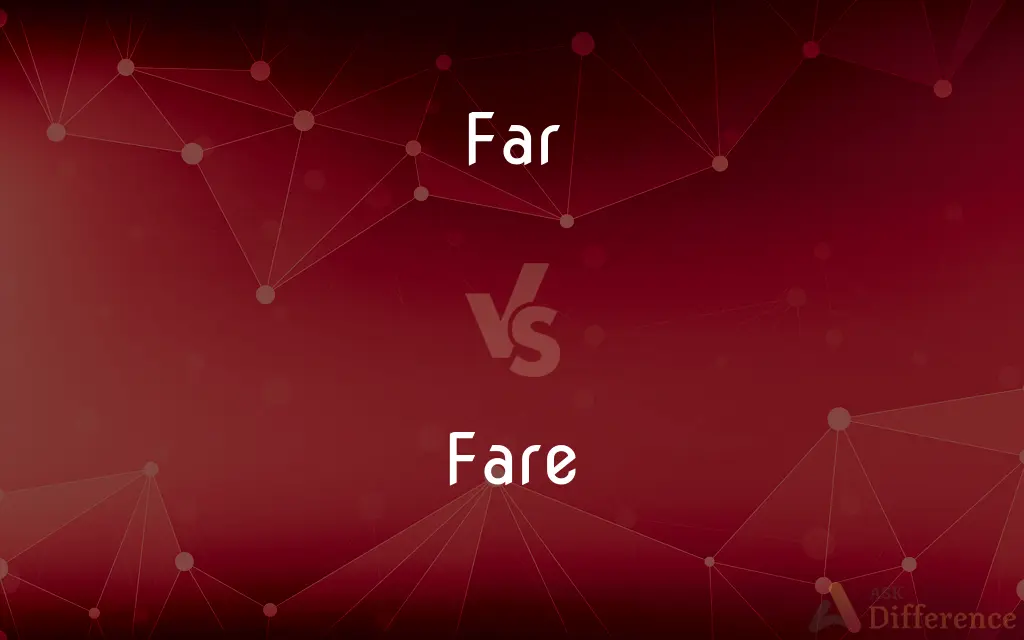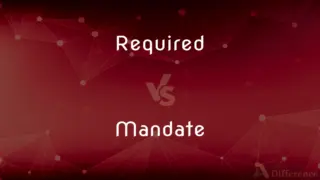Far vs. Fare — What's the Difference?
By Urooj Arif & Maham Liaqat — Updated on April 26, 2024
Far is used to describe distance or extent, indicating a considerable spatial separation; fare refers to a fee for transportation or a person's performance or progress.

Difference Between Far and Fare
Table of Contents
ADVERTISEMENT
Key Differences
Far primarily describes physical or metaphorical distance, suggesting something is a significant distance away. Whereas fare is used to indicate the cost of transportation, such as a bus ticket or taxi rate.
In usage, "far" often modifies adjectives or verbs to emphasize the extent of separation, as in "far-reaching" or "far gone." On the other hand, "fare" can also mean how someone manages or performs in a situation, typically expressed in phrases like "fare well" or "fare poorly."
The expression "as far as" is used to specify a scope or degree, e.g., "as far as the eye can see." Whereas "fare" can be a noun or a verb, influencing its application in a sentence depending on the context.
"Far" can be combined with other words to form compounds that describe distances, such as "far-off places" or "far-flung areas." In contrast, fare in the context of performance can encapsulate outcomes, like in "fair fare" in a review of a play's quality.
"Far" is an adverb or adjective, altering descriptions related to distance. Fare, however, can be both a noun related to cost and a verb that describes progress or quality of experiences.
ADVERTISEMENT
Comparison Chart
Part of Speech
Adverb, adjective
Noun, verb
Meaning
Distant, remote
Payment for transport, performance in a situation
Usage in Phrases
"far away," "far from"
"bus fare," "fare well"
Contexts
Describing distance or extent
Discussing costs, or evaluating performance
Related Terms
Farther, farthest
Farewell, fair
Compare with Definitions
Far
Used to indicate a great distance.
He lives far from the city.
Fare
Often used in polite or formal farewells.
We bid them farewell, hoping they fare well.
Far
In a figurative sense, implies a great extent or degree.
His idea is far from practical.
Fare
A fee paid for public transportation.
The bus fare has increased this year.
Far
Used in combination with comparative forms.
This place is far nicer than I expected.
Fare
Performance or state of progress.
She wondered how her children would fare without her.
Far
Often part of idiomatic expressions.
She could see the ship far off in the distance.
Fare
Can imply the provision of food.
The fare at the banquet was exquisite.
Far
Can indicate a preference or exclusion.
Far be it from me to criticize.
Fare
To experience good or bad fortune.
He fared poorly on his final exams.
Far
To, from, or at a considerable distance
A cat that had strayed far from home.
Fare
A fare is the fee paid by a passenger for use of a public transport system: rail, bus, taxi, etc. In the case of air transport, the term airfare is often used.
Far
To, from, or at a much earlier or later time
A movie that takes place far in the future.
Fare
The money paid for a journey on public transport
We should go to Seville, but we cannot afford the air fare
Far
To a considerable degree; much
Felt far better yesterday.
Eyes that seemed far too close together.
Fare
A range of food of a particular type
Traditional Scottish fare
Far
To an advanced point or stage
A brilliant student who will go far.
Fare
Perform in a specified way in a particular situation or over a particular period
The party fared badly in the elections
Far
Being at considerable distance; remote
A far country.
Fare
Travel
A knight fares forth
Far
Going back a considerable extent in time
The far past.
Fare
To get along
How are you faring with your project?.
Far
More distant than another
The far corner.
Fare
To happen or develop
How does it fare with you?.
Far
Extensive or lengthy
A far trek.
Fare
To travel; go.
Far
Far-seeing and comprehensive in thought or outlook
A commander of far vision.
Fare
To dine; eat.
Far
Marked by political views of the most advanced or extreme nature
The far right.
The far left.
Fare
A transportation charge, as for a bus.
Far
Being on the right side of an animal or a vehicle.
Fare
A passenger transported for a fee.
Far
Being the animal or vehicle on the right.
Fare
Food and drink; diet
Simple home-cooked fare.
Far
Distant; remote in space.
He went to a far land.
Fare
(obsolete) A going; journey; travel; voyage; course; passage.
Far
Remote in time.
The far future
Fare
(countable) Money paid for a transport ticket.
Train fare
Bus fare
Taxi fare
Far
Long. en
Fare
(countable) A paying passenger, especially in a taxi.
Far
More remote of two.
See those two mountains? The ogre lives on the far one.
He moved to the far end of the state. She remained at this end.
Fare
(uncountable) Food and drink.
Far
Extreme, as measured from some central or neutral position.
They are on the far right on this issue.
Fare
(uncountable) Supplies for consumption or pleasure.
The television channel tended to broadcast unremarkable downmarket fare.
Far
Extreme, as a difference in nature or quality.
Fare
A prostitute's client.
Far
Outside the currently selected segment in a segmented memory architecture.
Far heap; far memory; far pointer
Fare
To go, travel.
Behold! A knight fares forth.
Far
To, from or over a great distance in space, time or other extent.
You have all come far and you will go farther.
He built a time machine and travelled far into the future.
Over time, his views moved far away from mine.
Fare
(intransitive) To get along, succeed (well or badly); to be in any state, or pass through any experience, good or bad; to be attended with any circumstances or train of events.
Far
Very much; by a great amount.
He was far richer than we'd thought.
The expense far exceeds what I expected.
I saw a tiny figure far below me.
Fare
To eat, dine.
Far
To send far away.
Fare
To happen well, or ill.
We shall see how it will fare with him.
Far
Spelt (a type of wheat, Triticum spelta), especially in the context of Roman use of it.
Fare
(intransitive) To move along; proceed; progress; advance
We will continue to monitor how the hurricane fares against projected models.
Far
A young pig, or a litter of pigs.
Fare
To go; to pass; to journey; to travel.
So on he fares, and to the border comesOf Eden.
Far
Distant in any direction; not near; remote; mutually separated by a wide space or extent.
They said, . . . We be come from a far country.
The nations far and near contend in choice.
Fare
To be in any state, or pass through any experience, good or bad; to be attended with any circummstances or train of events, fortunate or unfortunate; as, he fared well, or ill.
So fares the stag among the enraged hounds.
I bid you most heartily well to fare.
So fared the knight between two foes.
Far
Remote from purpose; contrary to design or wishes; as, far be it from me to justify cruelty.
Fare
To be treated or entertained at table, or with bodily or social comforts; to live.
There was a certain rich man which . . . fared sumptuously every day.
Far
Remote in affection or obedience; at a distance, morally or spiritually; t enmity with; alienated.
They that are far from thee ahsll perish.
Fare
To happen well, or ill; - used impersonally; as, we shall see how it will fare with him.
So fares it when with truth falsehood contends.
Far
Widely different in nature or quality; opposite in character.
He was far from ill looking, though he thought himself still farther.
Fare
To behave; to conduct one's self.
She ferde [fared] as she would die.
Far
The more distant of two; as, the far side (called also off side) of a horse, that is, the right side, or the one opposite to the rider when he mounts.
Fare
A journey; a passage.
That nought might stay his fare.
Far
To a great extent or distance of space; widely; as, we are separated far from each other.
Fare
The price of passage or going; the sum paid or due for conveying a person by land or water; as, the fare for crossing a river; the fare in a coach or by railway.
Far
To a great distance in time from any point; remotely; as, he pushed his researches far into antiquity.
Fare
Ado; bustle; business.
The warder chid and made fare.
Far
In great part; as, the day is far spent.
Fare
Condition or state of things; fortune; hap; cheer.
What fare? what news abroad ?
Far
In a great proportion; by many degrees; very much; deeply; greatly.
Who can find a virtuous woman ? for her price is far above rubies.
Fare
Food; provisions for the table; entertainment; as, coarse fare; delicious fare.
Far
A terrorist organization that seeks to overthrow the government dominated by Tutsi and to reinstitute Hutu control;
In 1999 ALIR guerrillas kidnapped and killed eight foreign tourists
Fare
The person or persons conveyed in a vehicle; as, a full fare of passengers.
Far
At a great distance in time or space or degree;
We come from a far country
Far corners of the earth
The far future
A far journey
The far side of the road
Far from the truth
Far in the future
Fare
The catch of fish on a fishing vessel.
Far
Being of a considerable distance or length;
A far trek
Fare
An agenda of things to do;
They worked rapidly down the menu of reports
Far
Being the animal or vehicle on the right or being on the right side of an animal or vehicle;
The horse on the right is the far horse
The right side is the far side of the horse
Fare
The sum charged for riding in a public conveyance
Far
Beyond a norm in opinion or actions;
The far right
Fare
A paying (taxi) passenger
Far
To a considerable degree; very much;
A far far better thing that I do
Felt far worse than yesterday
Eyes far too close together
Fare
The food and drink that are regularly consumed
Far
At or to or from a great distance in space;
He traveled far
Strayed far from home
Sat far away from each other
Fare
Proceed or get along;
How is she doing in her new job?
How are you making out in graduate school?
He's come a long way
Far
At or to a certain point or degree;
I can only go so far before I have to give up
How far can we get with this kind of argument?
Fare
Eat well
Far
Remote in time;
If we could see far into the future
All that happened far in the past
Far
To an advanced stage or point;
A young man who will go very far
Common Curiosities
How do "far" and "fare" function grammatically?
"Far" is primarily an adverb or adjective, while "fare" can be both a noun and a verb.
How is "fare" used as a verb?
It means to perform or progress in a certain way.
Is there a difference between "farther" and "far"?
"Farther" specifically refers to physical distance, while "far" can be more general.
What does "far-reaching" imply?
It denotes something with a wide scope or significant impact.
What are examples of "fare" used in everyday language?
Commonly refers to transport costs or how someone manages in a situation.
What does "far" imply in different contexts?
In spatial terms, it indicates a large distance; metaphorically, it suggests a great degree or extent.
Can "far" and "fare" be used interchangeably?
No, they are used in different contexts and have distinct meanings.
Can "far" indicate a temporal distance?
Yes, it can be used to denote a significant time period, e.g., "far in the future."
What is the origin of "fare"?
Derived from Old English 'faran,' meaning to travel.
Does "fare" have a plural form?
Yes, it can be used in plural, e.g., "various fares across the city."
How do you use "fare" in a sentence regarding transportation?
"The taxi fare from the airport was quite high."
What does "farewell" mean?
A goodbye or a wish for good fortune.
How can "far" modify another adjective?
It can intensify, e.g., "far more important."
How does context affect the use of "far"?
Its meaning can shift from physical distances to metaphorical extents based on context.
What kind of phrase is "fare thee well"?
An archaic or poetic way of wishing someone good fortune.
Share Your Discovery

Previous Comparison
Passionate vs. Sensual
Next Comparison
Required vs. MandateAuthor Spotlight
Written by
Urooj ArifUrooj is a skilled content writer at Ask Difference, known for her exceptional ability to simplify complex topics into engaging and informative content. With a passion for research and a flair for clear, concise writing, she consistently delivers articles that resonate with our diverse audience.
Co-written by
Maham Liaqat













































